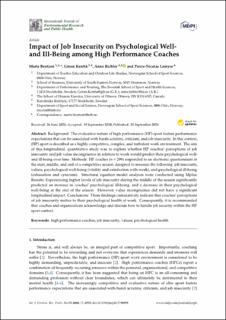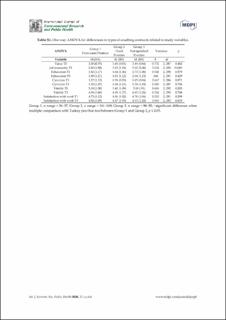Impact of job insecurity on psychological well- and ill-being among high performance coaches
| dc.contributor.author | Bentzen, Marte | |
| dc.contributor.author | Kenttä, Göran | |
| dc.contributor.author | Richter, Anne | |
| dc.contributor.author | Lemyre, Nicolas | |
| dc.date.accessioned | 2020-10-20T14:59:29Z | |
| dc.date.available | 2020-10-20T14:59:29Z | |
| dc.date.created | 2020-09-24T10:26:12Z | |
| dc.date.issued | 2020 | |
| dc.identifier.citation | International Journal of Environmental Research and Public Health. 2020, 17(19), 6939. | en_US |
| dc.identifier.issn | 1661-7827 | |
| dc.identifier.uri | https://hdl.handle.net/11250/2683989 | |
| dc.description | This article is an open access article distributed under the terms and conditions of the Creative Commons Attribution (CC BY) license (http://creativecommons.org/licenses/by/4.0/). | en_US |
| dc.description.abstract | Background: The evaluative nature of high performance (HP) sport fosters performance expectations that can be associated with harsh scrutiny, criticism, and job insecurity. In this context, (HP) sport is described as a highly competitive, complex, and turbulent work environment. The aim of this longitudinal, quantitative study was to explore whether HP coaches’ perceptions of job insecurity and job value incongruence in relation to work would predict their psychological well- and ill-being over time. Methods: HP coaches (n = 299) responded to an electronic questionnaire at the start, middle, and end of a competitive season, designed to measure the following: job insecurity, values, psychological well-being (vitality and satisfaction with work), and psychological ill-being (exhaustion and cynicism). Structural equation model analyses were conducted using Mplus. Results: Experiencing higher levels of job insecurity during the middle of the season significantly predicted an increase in coaches’ psychological ill-being, and a decrease in their psychological well-being at the end of the season. However, value incongruence did not have a significant longitudinal impact. Conclusions: These findings cumulatively indicate that coaches’ perceptions of job insecurity matter to their psychological health at work. Consequently, it is recommended that coaches and organizations acknowledge and discuss how to handle job security within the HP sport context. | en_US |
| dc.language.iso | eng | en_US |
| dc.subject | high performance coaches | en_US |
| dc.subject | job insecurity | en_US |
| dc.subject | values | en_US |
| dc.subject | psychological health | en_US |
| dc.title | Impact of job insecurity on psychological well- and ill-being among high performance coaches | en_US |
| dc.type | Peer reviewed | en_US |
| dc.type | Journal article | en_US |
| dc.description.version | publishedVersion | en_US |
| dc.rights.holder | © 2020 by the authors | en_US |
| dc.source.pagenumber | 15 | en_US |
| dc.source.volume | 17 | en_US |
| dc.source.journal | International Journal of Environmental Research and Public Health | en_US |
| dc.source.issue | 19 | en_US |
| dc.identifier.doi | 10.3390/ijerph17196939 | |
| dc.identifier.cristin | 1832873 | |
| dc.description.localcode | Institutt for lærerutdanning og friluftslivsstudier / Department for Teacher Education and Outdoor Studies | en_US |
| dc.source.articlenumber | 6939 | en_US |
| cristin.ispublished | true | |
| cristin.fulltext | original | |
| cristin.qualitycode | 1 |
Tilhørende fil(er)
Denne innførselen finnes i følgende samling(er)
-
Artikler / Articles [2096]
-
Publikasjoner fra Cristin [1084]

